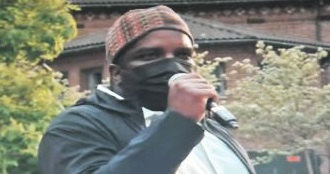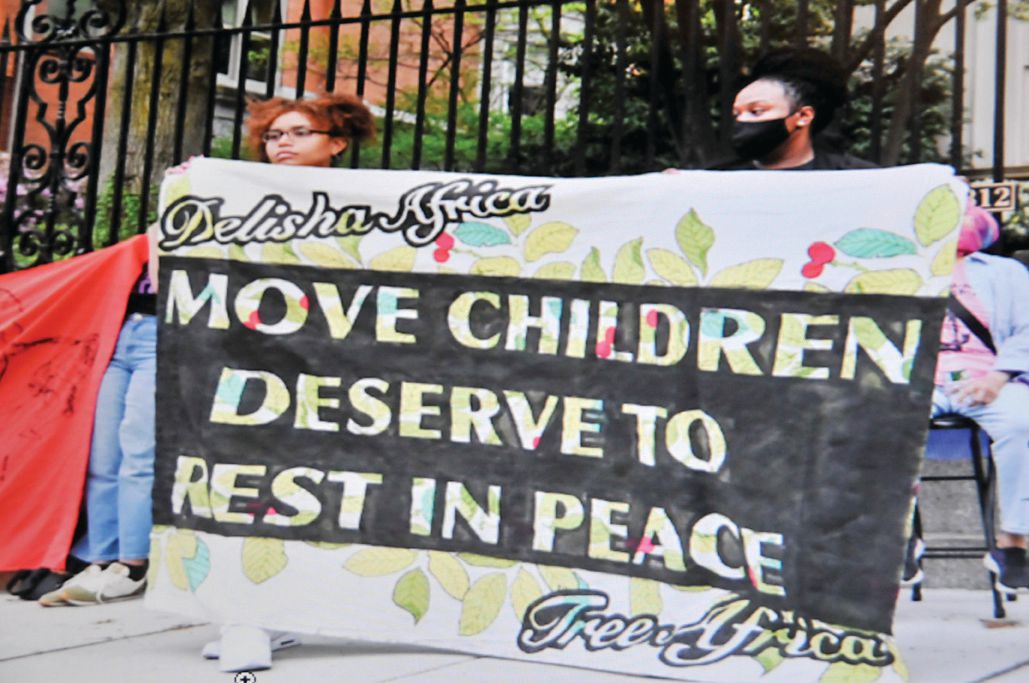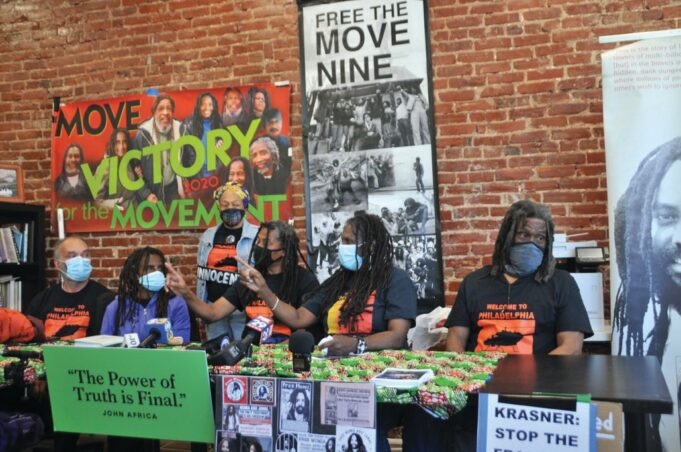PHILADELPHIA—Last year the Philadelphia City Council formally apologized for the May 13, 1985 police bombing, which killed six adults and five children and decimated 60 homes. Painful memories of the attack and other injustices perpetrated on the MOVE organization resurfaced recently, pulling a scab off an open wound when the University of Pennsylvania and Princeton University acknowledged that for the past 36 years, anthropologists have been using the bones of Tree Africa, 14 and Delicia Africa, 12.

Both children were bombing victims and their remains are being used for a video course posted online called “Real Bones Adventures in Forensic Anthropology,” by Penn museum curator, Janet Monge, and a visiting Princeton University professor.
According to social activist and reporter Abdul Aliy Muhammad, whose Philadelphia Inquirer story broke open the dirty little secret held by the museum stated, his investigation began with the discovery the museum held the remains of about 53 people believed to be enslaved, 51 of them from Cuba, from a plantation in Vedado and two craniums (skulls) from Black people in New York. It was then learned this was only the tip of the iceberg when it was discovered the collection was part of the “Morton Collection” held by Penn.
A collection of more than 1,000 skull remains amassed by Dr. Samuel G. Morton, a White supremacist scientist determined to highlight racial differences in skeletons, according to a Penn Press release. Morton’s collection largely included remains retrieved by robbing Black gravesites throughout the 19th century. From this rabbit hole the remains of the two MOVE children emerged.
What has gone lacking in the firestorm of press reports that followed is the full impact of the pain, trauma, and suffering Black people have undergone at the hands of White supremacy. This trauma was on full display during a press conference held on April 26 by the MOVE organization to address the revelation.
The press conference guided by Pam Africa featured panelists Eddie Africa, Consuewella Africa, Janine Africa, Janet Africa, and Carlos Africa. White-hot pain enveloped the room as panelists detailed the atrocities perpetrated against the group by the city and Philadelphia Police Department through the years. Starting in 1973, Janeen Africa talked about the death of her three-month-old daughter at the hands of the police. A 1978 assault on the MOVE compound resulted in the brutal beating of Delbert Africa and the imprisonment of the MOVE member for 40 years. Then was the tragic bombing in 1985. Now this.
“I feel like I’m reliving this trauma because for 36 years, I haven’t forgotten, but I have not had to have this on my mind. And then I see a news article of them saying not only did they kill my children, kill my sisters and brothers, but they have desecrated what they say are their remains, defiled them, and had them hidden away on exhibit as a learning tool for their students. That is the most disrespectful, hateful thing to do to anybody, but especially children,” Janine Africa said.
“We never knew anything about the remains of our family. Nothing,” said Janet Africa. “We were in jail. When I read the article, it said that they had the remains of our family, and they had told us about it; that was a lie. Adventures in Anthropology sounds like an amusement park ride.”
The MOVE family implored the press that attended the conference to tell the truth about the city and its death dealing genocidal behavior against MOVE.
“They killed my sisters, my brothers; they can’t repair what they have done. There are no demands that they could meet to rectify this situation, nothing, no action. Our sisters, our brothers, our animals are gone. If they want to do anything, anything to show people that they are sincere about resolving this situation with MOVE and the city, let Mumia Abu Jamal out,” concluded Janeen Africa, referring to the journalist and former Black Panther imprisoned for the last four decades. He was convicted for the 1981 killing of a Philadelphia police officer. He and his supporters have maintained his innocence.
The chronology of how the remains came to Penn was outlined by Mr. Muhammad. “The remains were given to Alan Mann, a Penn forensic anthropologist who was hired to study the remains by a city commission investigating the bombing in 1985,” he reported. Ms. Monge was a PhD. candidate and assisted Mr. Mann at the time. According to Mr. Muhammad, the remains were supposed to have been returned to the family in December of 1985. The partial remains of Tree and Delesha ended up in a box on a shelf at the Penn museum where they were subsequently shuffled back and forth between Penn and Princeton by both Mr. Mann and Ms. Monge.
The University of Pennsylvania issued an apology to MOVE through the media. “The Penn Museum and the University of Pennsylvania apologize to the Africa family and to our community for allowing human remains recovered from the MOVE house to be used for research and teaching, and for retaining the remains for far too long,” the statement said in part.

“We understand the importance of reuniting the remains with the family and we are working now to find a respectful, consultative resolution. In all of this, we are constantly bearing in mind that human remains need to be treated with the dignity and respect that they deserve,” it continued.
During a protest rally on the campus of the University of Pennsylvania, which end-ed at the residence of the president, 2nd generation MOVE member Mike Africa Jr., put a human face on Tree and Delesha and MOVE children in general. “We spent a lot of time together, something that people don’t really like know about Tree and Delesha and the other children one of the reasons we were together is because our parents were in prison,” reflected Mike Africa Jr. “You know, Tree’s mother is Consuewella. She was in prison with my mother, and Delesha’s mother is Janet and she was in prison with my mother as well,” he continued.
“You know we just bonded, but we were so close to each other. We did everything together. We slept in the same room together. We laughed together. We cried together; we were terrified together.” Mike Africa Jr., talked about the mischief Delesha would get into and the trees Tree used to like to climb. Mr. Africa spoke about the cruel mistreatment the children suffered when at one point they were placed in foster care.
Dr. Krystal Strong, an assistant professor at the University of Pennsylvania in the Graduate School of Education with affiliations in Anthropology and Africana Studies, conducted an emotional conversation with Mike Africa Jr., as a part of the demonstration. During the conversation, she observed, “Part of the intention of coming to this place is that in the response that we’ve seen so far, there have been sidesteps, half-truths, mischaracterization, falsehoods, shallow apologies that were not delivered to the MOVE family, but that were sent through the media and on an email blast, but not directly to MOVE members.”
She added, “I hope you all feel how palpable, how present the pain is for members of the MOVE family who were having to relive all of these traumas with new traumas on top of that so close to the anniversary of the May 13 bombing. This is the first year after the city’s so-called apology; and we see that we haven’t even uncovered all of the harms,” said Dr. Strong.
The Philadelphia Tribune reports the remains of the children have magically appeared after numerous denials of who had them. A Philadelphia funeral home was scheduled to pick up the remains of Delisha Africa and Tree Africa on April 30 from the home of Alan Mann, the newspaper reported. “Gregory Burrell, president and CEO of Terry Funeral Home, told the Tribune he was contacted by Penn Museum director Chris Woods earlier this week to start the process,” noted the newspaper.
As far as closure, Mr. Africa said, there’s nothing that can be done to fix or repair anything. “In our strategy, we are assembling a team, building a team of strategic-minded people. And we want to come up with a strategy, and we’re going to figure out what the next steps look like soon,” he said.
“The revolutionary mentality of John Africa is simple: to protect life,” he said, referring to the leader of MOVE who was killed in the 1985 police bombing.
“We encourage other people to protect life too. And when we say life, we’re talking about people, animals, and the environment, and having that belief seems simple cause it is. Still, it is an extreme threat to the system because when you’re talking about protecting life and these people are talking about punishing life, the murder of life, right? The pollution. John Africa taught MOVE people this belief and MOVE practice, and this stance is what we were attacked for.”













